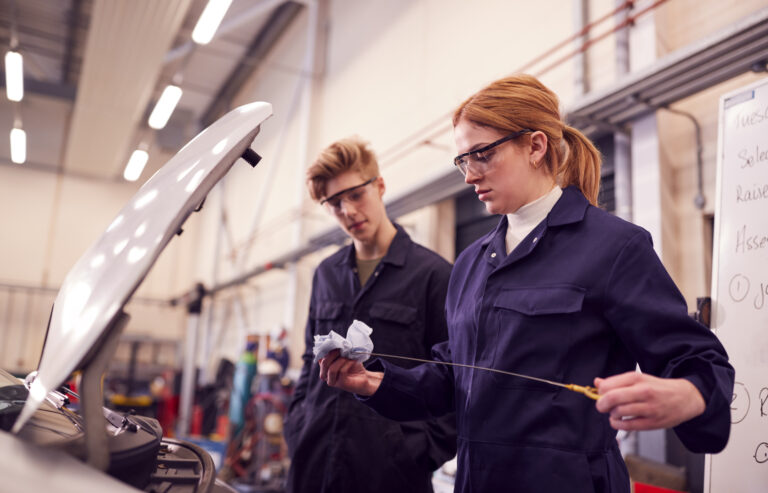In this article we consider the effectiveness of degree apprenticeships in delivering social mobility.
The Sutton Trust is a leading education charity that ‘champions social mobility through programmes, research and policy influence’ [1]. CEO, James Turner, spoke at our National Apprenticeship conference in January 2021.

Are Degree Apprenticeships Delivering Social Mobility for Young People?
The Sutton Trust works to understand whether degree apprenticeships are delivering social mobility for young people. They found that people generally believe apprenticeships are succeeding in delivering social mobility because those taking apprenticeships are predominantly from working-class backgrounds or lower-income homes. However, the data shows that if you just look at higher level apprenticeships, those that lead to the best wage return, the situation is very different [2].
The trust published its Degree Apprenticeships Report, in 2020. These statistics, collected before the pandemic highlight the pre-existing inequalities many apprentices face:
- Just 13% of degree apprentices come from the most deprived neighbourhoods compared to 27% from the wealthiest
- Only 20% of degree apprentices are aged 20 or under, with 50% aged over 25
- The proportion of degree apprentices who are older and more affluent has doubled [2]
Data collected by the trust in October 2020 indicates that these inequalities have been exasperated by the circumstances surrounding the pandemic. Apprentice employers reported that:
- 12% of their apprentices had been made redundant
- Only 1 in 3 apprenticeships were continuing as normal
- 14% could not take up working from home due to lack of device or internet access
- 8% of apprentices were still furloughed
While employers were more positive than in April, with a quarter now planning to hire more apprentices in the coming year, 1/3rd said they were planning to hire fewer or no apprentices at all [2]. James emphasised that since these statistics were recorded, we have had 2 further lockdowns and that we must consider the further impact these may have had [2].
How do we overcome the challenges moving forward?
‘The Degree Apprenticeships: Levelling Up?’ report concludes:
‘Degree apprenticeships are full of promise for social mobility. They offer a combination of practical on the job training with the portability of a university degree. They allow young people to earn a salary while learning and avoid the levels of debt experienced by traditional university students. However, put simply, the degree apprenticeship programme is not delivering for social mobility’ [3]
Suttontrust.com. 2020. Degree Apprenticeships: Levelling Up?
James talked us through the steps the trust believes are necessary to ensure that higher-level apprenticeships deliver social mobility.
Firstly, increase the number of high apprenticeships available to young people.
Similarly, information and guidance around apprenticeships remain key. It is important to get the message out to schools, students and parents so that they are aware of the opportunities available.
Additionally, a widening participation culture needs to be embedded within the apprenticeship cycle. James suggested spending a proportion of the Levy on outreach programs, travel bursary and access programmes. The Sutton Trust is starting an apprenticeship summer school to help low-income sixth formers make good decisions about their future and get onto the best apprenticeship schemes.
Finally, degree-level apprenticeships should continue to be within the scope of Levy funding. James argued that no one should be excluded for financial reasons [2].
With pandemic restrictions continuing to impact the UK’s economy, it is more important than ever that the levy is focused on where it can have the greatest impact.
The report concludes, that we must ensure ‘limited levy funds are not being used on highly paid executives,’ instead of focusing on creating new opportunities and upskilling those who might benefit the most [3]. The levy has the opportunity to ensure ‘growing opportunities for young people and providing bridges to social mobility’ [3].
The trust has conducted several reports to understand to what extent apprenticeships contribute to levelling up:
- Sutton Trust survey shows Covid-19 is continuing to have an impact on apprentices
- COVID-19 and Social Mobility Impact Brief #3:Apprenticeships. The third in a series of COVID-19 Impact Briefs, this report looks at how the pandemic is impacting the apprenticeship sector, in particular, those from disadvantaged backgrounds
- Degree Apprenticeships: Levelling Up? This report looks at whether apprenticeships at levels 6 and 7 are proving to be the powerful vehicles for social mobility they have the potential to be
Sources:
[1] Suttontrust.com [online] [Accessed 20/04/21]
[2] Turner, J., 2021, National Apprenticeship Conference
[3] Suttontrust.com. 2020. Degree Apprenticeships: Levelling Up? [online] [Accessed 20/04/21]
Register FREE to access 2 more articles
We hope you’ve enjoyed your first article on GE Insights. To access 2 more articles for free, register now to join the Government Events community.
(Use discount code CPWR50)




